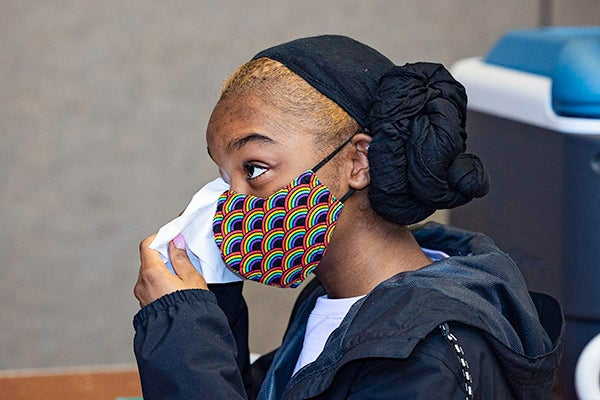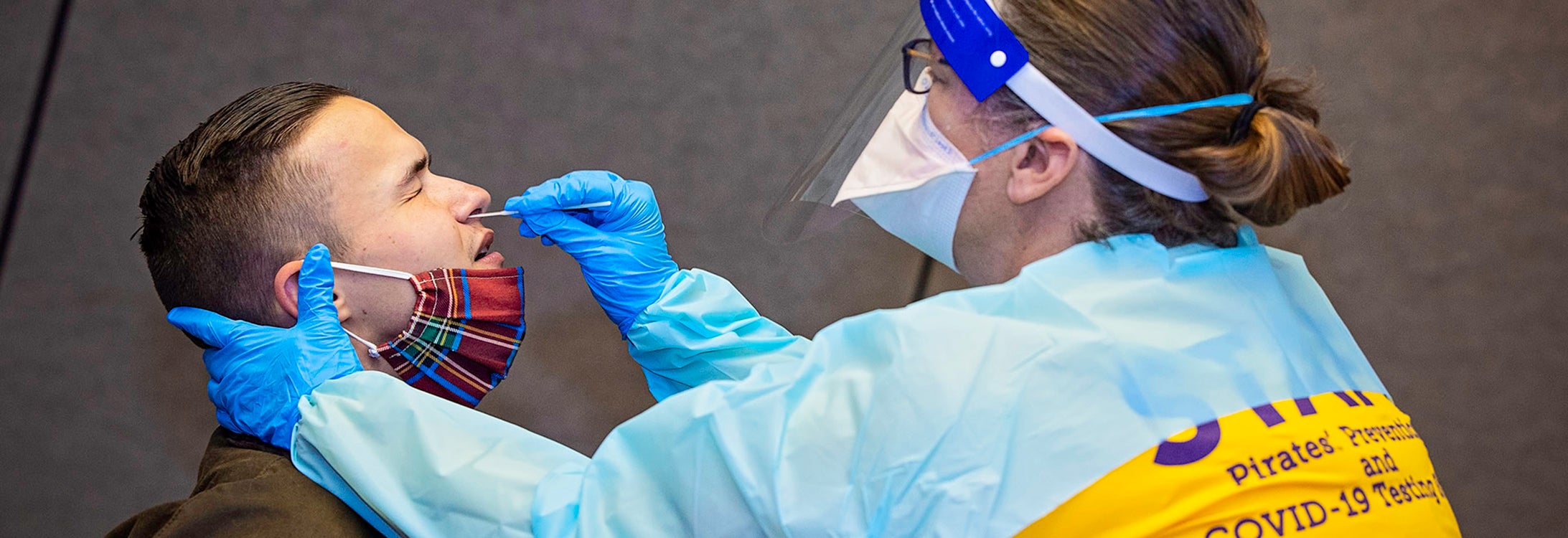PIRATEPACT
Student participation helps researchers study COVID-19
As students arrived on East Carolina University’s campus for the fall semester, a team of researchers led by Dr. Suzanne Lea, associate professor in the Brody School of Medicine’s Department of Public Health, launched a study to track COVID-19 among students living on campus.
In the midst of recruiting students to participate, ECU was forced to pivot away from on-campus instruction, and most students left the residence halls.
“We planned the study based on students taking face-to-face courses on campus,” Lea said. “But we were able to adjust our research plan quickly, and … we had really terrific participation among the students that remained living in the dorms and remained in Pitt County.”

Chanelle Turnbull wipes her eyes after getting tested for COVID-19.
By expanding the eligible participants from freshmen in the residence halls to any student remaining in Pitt County, the team was able to register 136 participants who were tested every two weeks during the fall semester. They had a nasal swab test every visit to detect the active virus and a blood draw every other visit to test for antibodies. They also completed a survey each time about their prevention behaviors over the two weeks prior.
“We also collected data on many other factors, such as employment status, stress level, and their perceptions about COVID impact in their life,” said Lea.
She said the project provided a snapshot of what was going on with the virus in the student population, particularly in the context of what was happening in Pitt County and statewide during fall semester 2020.
At the end of fall semester 2020, “We found out that the occurrence of COVID disease among the ECU students in the sample was about 10%,” Lea said.
One interesting data point, though the sample size is small, is that students who reported symptoms at time of testing positive for COVID-19 developed an antibody response sooner than students who did not report symptoms and tested positive for COVID-19.
“There’s little information on antibody conversion in healthy young adults who are followed over several months. Many studies have examined antibody conversion in the hospital setting with patients and healthcare workers.”
The students, she said, connected with the idea of contributing to new science and also appreciated the opportunity to be tested regularly. The study is continuing into the spring semester 2021, with the same group of students coming back once a month for both a swab test and a blood draw.
Graduate student Collin Krenz said he joined the study after having COVID-19 in September. “I thought it would be a great way to check antibodies and keep myself updated on how I’m doing,” he said.
Madison DesChenes, a senior dance major, said the regular testing helped give her peace of mind since she was coming to dance studios on campus — “Especially because I live with my grandma. I don’t want to get her sick or exposed to anything,” she said.
For senior Chanelle Turnbull, seeing others catch COVID-19 during the fall semester was an eye-opener, and the study seemed like a good idea. But she said she hasn’t gotten used to the nasal swab.
“It’s not as bad as the first time, but it still makes my eyes water,” she said.
“We have a lot of students who are very engaged with the process,” Lea said. “They appreciate the opportunity to be tested regularly, to participate in the research process, to learn science and learn about COVID-19. Many of them recognize that they are helping science learn something.”
Along with Lea, co-investigators on the study include Dr. Charleen McNeill of the College of Nursing and Drs. Kristina Simeonsson, Aaron Kipp and William Irish of the Brody School of Medicine.
